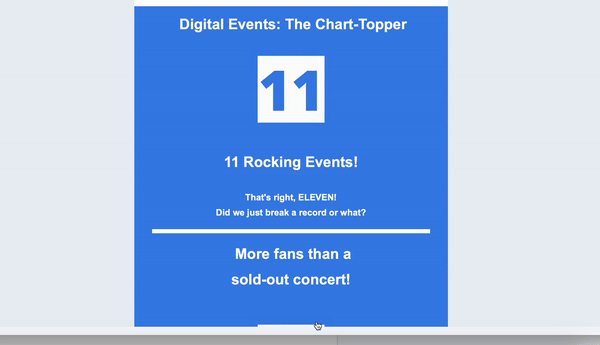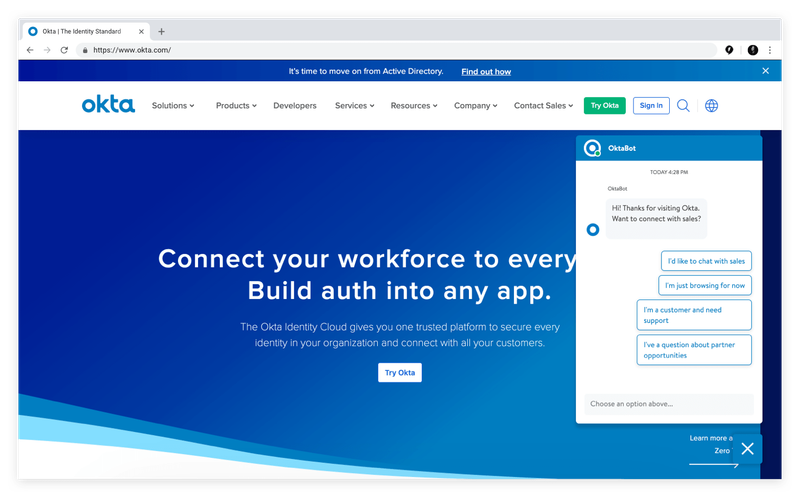Using AI in B2B Marketing: Use Cases, Limitations & Examples

Table of Contents
Maximize Your Marketing ROI
Join 10,000 other marketers already getting the best tips on running engaging events that boost pipeline and create raving fans.
From the helpful robots in the Jetsons to the dystopian future portrayed in sci-fi thrillers like Blade Runner, artificial intelligence (AI) has long captured our fascination. Today, AI is more than just a futuristic concept on the big screen (and, in most cases, far less ominous).
It’s a reality that’s already transforming modern business. And this extends to B2B marketing. But as marketers continue to find the balance between innovation and integrity with AI, top companies are already heavily investing in it.
“If you’re not embracing AI right now, you’re not on the right path,” says VP of experiential marketing at Capital Group Ajith Krishnankutty.
While AI brings both opportunities and challenges, one thing is clear: embracing it is essential for long-term success in B2B marketing. And those who know how to harness it responsibly, will be positioned to win more awareness, revenue and ROI for their brands.
What is AI in B2B marketing?
B2B companies are currently using AI technology like advanced algorithms and machine learning to automate and enhance marketing processes, from content generation and analytics to personalization and predictive modeling.
Incorporating AI into these processes helps marketers gain deeper insights, streamline workflows, and deliver more targeted campaigns.
Artificial intelligence vs. machine learning
While sometimes used interchangeably, AI and machine learning aren’t quite the same thing. AI is a broader term that encompasses technologies that mimic human intelligence — machine learning is included in this sweep, as well as natural language processing, robotics, and more.
Machine learning, on the other hand, refers specifically to algorithms that can automatically learn from data without being explicitly programmed to do so.
It’s sort of a square/rectangle situation — machine learning is AI, but all AI isn’t machine learning. However, many AI tools in B2B marketing are powered by machine learning.
AI in B2B marketing: top use cases
Ultimately, B2B marketers are looking for one thing from AI: return on investment. (Now you’re speaking our language. 💸)
So, what are the highest-ROI use cases for AI? Let’s dig into how marketers are using this tech to get better insights, automate repetitive tasks, and engage their audiences.
AI and content generation
Following the rise of generative AI (GenAI), AI has found its place solidly in the content generation process.
Marketers are using GenAI tools to assist in creating content like:
- Blog posts
- Social content
- Product descriptions
- Email campaigns
- Marketing events
Of course, you’ll notice we didn’t say marketers are using it to create this content. We’ve already seen how important it is to keep a human touch in the content creation process. AI can save you time and, notably, help you scale your content efforts.
But readers (and search engine algos) don’t appreciate generic content today any more than they ever did. That’s why incorporating unique perspectives and brand-specific expertise is absolutely crucial.
For content marketers, AI can be a powerful ally to the creative process. It doesn’t, however, replace the indispensable human mind.
AI and content repurposing
Speaking of content, if we’re using AI to create it, it only makes sense to keep that momentum going by incorporating AI into your content repurposing strategy. Make the most of your content by transforming it for a variety of channels — social media, newsletters, events, and more.
Here are some of our favorite tips for repurposing content with AI:
- If you said it, write it. If you wrote it, say it. Podcasts turn to blog posts, and infographics turn to animated videos with voiceovers.
- Use AI to remove people from the content assembly line. Automation helps accelerate the repurposing process.
- Keep quality standards sky-high. At this point, AI tools can’t be fully trusted with anything.

AI and predictive analytics
Marketers are always looking to get more value from analytics, and this is an area where AI really shines. By analyzing vast amounts of your business’s data, these tools can reveal insights into customer behavior, preferences, and future trends.
You’ll need quality data inputs like:
- Social engagement
- Website analytics
- Campaign performance
- Event analytics
With the help of machine learning, you can use this info to create data-driven marketing strategies, invest in the right places, and get better results. But remember: AI’s output is only as good as your input. Without the highest-quality data, predictive analytics can lead marketers in search of optimization astray.
AI to scale personalization
It’s hard to overstate the value of creating personalized experiences in marketing. However, scaling this strategy can be tricky. First, you have to use customer data to identify how a prospect or customer would like their experience tailored to them, and then you have to actually deliver that customer experience.
Luckily, AI can help by segmenting audiences, predicting their preferences, and tailoring content to individual prospects or groups. The results: smart segmentation, more engagement, higher conversions.

4 examples of AI in B2B marketing
There are big promises about AI’s value in marketing. But what does incorporating AI into your B2B marketing strategy actually look like in practice?
Here are four real-world examples.
Repurposing event content for social media: Modern Sales Pro
Digital events are a gold mine of exciting, authoritative content. But who has time to rewatch hours of webinars to identify those hard-hitting snippets for reuse?
Eduardo Duarte Ruas, Marketing Manager at Modern Sales Pro, uses our Content Lab tool to automatically pull content out for his social calendar.
“I believe it’s going to be really fantastic,” says Eduardo. “We have a full calendar of social media and we are counting on the Content Lab to be able to help us with this task for next year.”

Integrating analytics for personalization: Khoros and 6sense
Customer engagement platform Khoros integrated AI-driven intent data from 6sense with their own behavioral data to create highly personalized, real-time website experiences for their audience. Customized pages and modules matched content to each visitor profile, resulting in double the pageviews and quadruple the demos.
“We don’t have a lot of resources,” explains Nathan Stull, Senior Manager of Web Marketing. “Something like this honestly could take a whole full-time position.” With the power of AI, the team went from zero personalization to planning for global expansion of this AI use case.
Conversational AI to boost conversions: Drift
Drift’s patented Conversational AI uses natural language processing technology to understand and respond to prospects’ messages. Website visitors state their intent in an open-text format, and get an experience that feels like chatting with a human.
What differentiates Conversational AI from other similar models is its training on more than 100 million B2B sales and marketing conversations. It’s hyper-focused on providing relevant info, qualifying leads, and converting prospects. Drift’s Conversational AI tool increases engagement by 40% compared to button-only chatbots.

Internal executive summaries: FullStory
Marketers already know that at the moment, AI doesn’t necessarily generate a polished, final product ready for the eyes of thousands of prospects.
But how about using that output internally to keep everyone on the same page?
Here’s an example: Georgianne Parker, Senior Manager, Events & Field Marketing at FullStory, uses AI to automatically create a summary of every event the marketing team executes. These summaries go straight to the sales team, so they’re always up-to-date on their prospects’ latest brand experiences.
AI and sales
Sure, we’re talking about marketing here—but what is marketing without an effective sales counterpart?
As they work together with sales, marketing teams need to know how AI fits into their sales enablement strategies.
AI’s predictive analytics and personalization capabilities are huge assets to sales teams, empowering:
- More accurate lead qualification and scoring
- Tailored sales pitches
- Automated follow-up strategies
- Personalized messaging at the account level
These benefits can help our friends in sales prioritize their efforts, nail their follow-up timing, and close more deals.
Run smarter, more engaging events with Goldcast
AI has unlocked a powerful and ever-expanding set of marketing tools. But the most successful marketers are those who know that true intelligence lies in the humans wielding these technologies, not in the tools themselves.
Incorporating AI into your marketing strategies starts with using modern B2B marketing platforms with AI-powered features that can help you be even better at what you already do best.
And for B2B marketing events, it doesn’t get smarter than Goldcast. To see how Goldcast’s AI-driven features can boost your impact, book a free demo today.
Transform Your Video Marketing with AI
Stay In Touch
Platform
Resources
© 2026 Copyright Goldcast, Inc. All rights reserved.





 Upcoming Events
Upcoming Events Event Series
Event Series On-Demand Events
On-Demand Events

